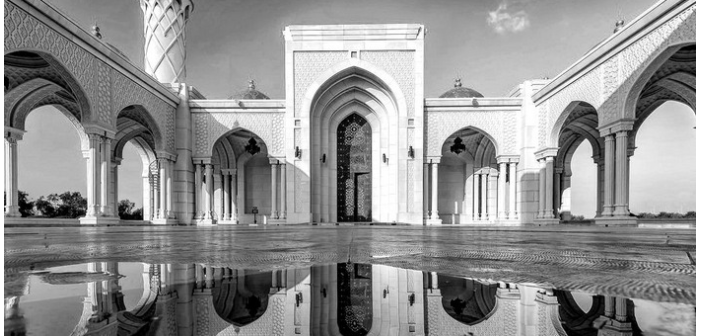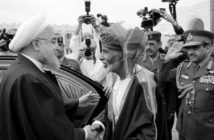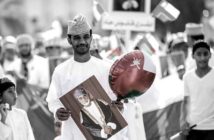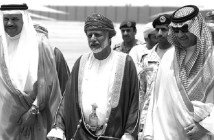In the Gulf region many people are looking at Oman and see it as a “silent country”, aloof from critical dangers facing the region. In particular the sultanate has been singled out for its refusal to join Saudi Arabia’s coalition intervening in the Yemen crisis. But how silent is Oman really
Beyond the mainstream news outlets, social media in the Gulf region acts as a key barometer of controversial opinions and views on politics. Close observation of social media, including Twitter and Facebook, reveal some interesting discussions among the general public. In recent months it has become increasingly apparent that many people in the wider Gulf Cooperation Council (GCC) region perceive Oman as having a quietist and detached approach to regional affairs.
In reality Oman is not as “silent” as it appears when it comes to regional politics. There are several factors supporting this conclusion. Behind the scenes Oman is playing a very active peacemaker role in most of the regional issues. To start with it has played a crucial role in one of the most complicated issues; Iran’s nuclear program and its struggles and recent negotiations with the West. After years of hostility and provocative statements between these long-time antagonists, discussions began secretly through Omani agency. When the discussions between Iran and 5+1 bore fruit in reaching the framework agreement, the foreign ministers of USA and Iran were highly thankful for the quietly active role of Oman.
In Yemen Oman is also more active than it seems. Saudi Arabia and its allies have been waging a campaign against the Houthi’s and forces loyal to former President Ali Abdullah Saleh’s in Yemen for more than three months. All the gulf countries joined Saudi Arabia as allies in this campaign except Oman –this is one of the main reasons why many Gulf people consider Oman as being apart from them and maybe even closer with Iran. This is a misconception and reveals a misunderstanding of Oman’s longstanding policy of positive neutral engagement with all its neighbours. This policy explains why Oman did not join the Saudi allies against the Houthis and Saleh Militia, but it continues to play a critical role in this conflict in contrast to the perception that they are just staying silent to put their heads in the sand.
In the beginning of the al-Hazim storm operation in late-March 2015, the Saudi-backed Yemeni president, Abd Rabbuh Mansur Hadi sought ways to escape the country. In order to secure a safe passage he used good contacts with Oman and left his country to Salalah in southern Oman before flying to Riyadh, where he arrived at the airport wearing the Omani traditional national dress (dishdasha). While the air strikes are continuing in Yemen, Oman continues to play an important humanitarian role on evacuating, treating, hosting and then transferring the wounded back to Yemen. On the 1 May 2015 different newspapers reported on an Omani airplane transferring between 40 and 122 Yemeni wounded from Muscat to Yemen after treatment.
On this issue, Al-Manra Channel broadcast the moments when an Omani airplane returned patients to Yemen who voiced their appreciation to the Omani people, while being critical of the negative effects of the Saudi campaign in Yemen. While Oman is only physically intervening in Yemen on humanitarian grounds, in terms of diplomatic activity, Oman has been highly active. They have arranged secret meetings between the Houthi’s and US officials to try to solve the conflict. Reuters has reported that the former president of Yemen and the current ally of Houthis Ali Abdullah Saleh understood these talks to be well intentioned. He said: “I am more than sure that the U.S. and Iran want Oman to conduct the mediations between the Houthis and Saudis.” On the same issue, one Omani official commented on the “progress in the talks toward an agreement on a long truce and reviving political dialogue.” In the same meeting, different observers speculated that these meetings were paving the way for the opening of negotiations between the warring factions for peace talks in Geneva. Once again Oman has played a pivotal role of facilitating initial steps toward political resolutions.
On a separate issue showing Oman’s international facilitating role, the sultanate has collaborated with the US in its efforts to close Guantanamo prison by agreeing to the transfer and hosting of six prisoners in Oman. All six detainees are Yemeni, and include alleged al-Qaeda members. CNN commented on the choice of Oman by the US as a country “that will provide security against possible trouble from former prisoners and human rights assurances regarding the former inmates.” Different US perspectives have highlighted the positive role of Oman in dealing with the problem of the former inmates, and the appreciation of the US Defence Department. While on the other hand some on the right in the US have criticized president Obama for sending “six dangerous terrorists to Oman, which borders Yemen — a country engulfed in civil war and that serves as the headquarters for al Qaeda’s most dangerous affiliate.”
These are some notions about Omani quietism in the international arena, but how does this perception of silence reflect in Oman’s recent internal politics? In the Omani street and ‘Twitter sphere’ interest is intensifying around different important political subjects. One of the most important issues surrounds the question of political participation. Oman’s lower house of parliament, which is called Al-Shura Council, is directly elected by citizens according to representation in willayats (districts). This council was established in1991 and now consists of 84 members based on population. The next elections will be held in October or November this year with an increase of one member, raising the number of members to 85. The increasing public interest in Oman’s parliament mirrors the government’s stated intention to gradually move towards more representative systems of government. This council increased in importance after 2011 when the government granted the Shura more powers and authority as a legislative body rather than its previous purely consultative role. Now, the council is regularly calling government ministers to the parliament and challenging them on their performance in continuous sessions. These sessions are broadcasted live through the government’s official media.
In the second week of June 2015, the government announced the list of candidates who will stand for election. Candidates must have a minimum age of 25, have no criminal history, and be able to finance their own campaign expenses. Despite the current increased status of the Shura council there are question marks on the latest candidate list, which excluded two incumbent Shura members from standing for reelection. In the “Twitter sphere” some social activists have started questioning the reasons for these exclusions. These question marks have been followed by twitter posts both criticizing and defending the government’s exclusions of certain candidates. One of the excluded members initially reacted strongly and threatened to reveal secret information regarding the government decision regarding the list of approved candidates, if he was not re-included. Overall, there is a growing expectation among Omani citizens for open transparency in political participation. However, against this, there is also a sentiment among most Omanis that continues to support the presence of the government’s guiding hand as it gradually looks to empower the legislative institutions.
The perspective, particularly by Oman’s neighbours in the Gulf, that Oman is ‘silent’ and passive regarding both internal and external politics, is not the case. Oman is in fact speaking up with its positive interventions in regional politics, and at the internal level the public and politicians alike are beginning to find their voices regarding critical issues of political participation.
by Omran Mohammed Zahran al-ABRI and Leon Goldsmith





